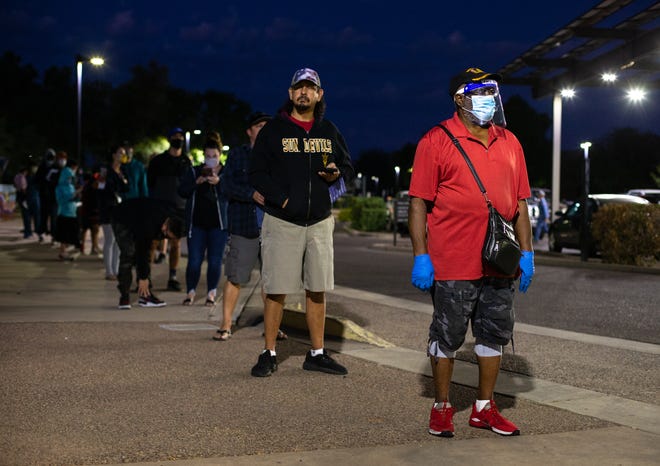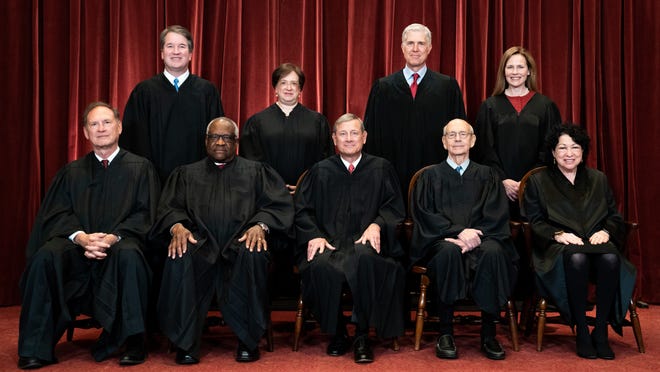Supreme Court OKs ‘ballot harvesting’ ban amid flurry of voting laws
WASHINGTON – A divided Supreme Court on Thursday upheld a controversial Arizona law that limits how voters may return absentee ballots, weighing into a raging debate over voting rights with a ruling that appeared to make it more difficult to challenge a growing number of state laws restricting access to the ballot box.
Associate Justice Samuel Alito wrote the opinion for a 6-3 majority, joined by the court’s conservatives. Associate Justice Elena Kagan wrote a dissent, joined by the court’s liberals, that described the majority opinion as “tragic.”
The case, the most significant to deal with voting rights to come before the court since 2013, dealt with two provisions of Arizona’s voting law approved long before the 2020 election. State officials passed a law in 2016 barring unions and advocacy organizations from collecting voters’ mail-in ballots, a practice that critics call “ballot harvesting.”
Another provision, which was even older, invalidates ballots that are cast in the wrong precinct. Neither of those regulations are unique to the Grand Canyon State.
Alito wrote that an appeals court in California erred when it concluded those rules ran afoul of the landmark 1965 Voting Rights Act.
That law, Alito wrote, “provides vital protection against discriminatory voting rules, and no one suggests that discrimination in voting has been extirpated or that the threat has been eliminated.” But, he wrote, the law “does not deprive the states of their authority to establish non-discriminatory voting rules.
Elsewhere, Alito said that states have a legitimate interest in passing voting laws in an effort to prevent fraud. That argument has emerged as a political flashpoint following last year’s election when former President Donald Trump blamed his loss to President Joe Biden on baseless allegations of fraud.
“Fraud can affect the outcome of a close election, and fraudulent votes dilute the right of citizens to cast ballots that carry appropriate weight,” Alito wrote. “Fraud can also
undermine public confidence in the fairness of elections and the perceived legitimacy of the announced outcome.”
Earlier:Dissent by Justice Thomas in election case draws fire for revisiting baseless Trump fraud claims
In a scathing dissent, Kagan accused the majority of weakening the Voting Rights Act.
“What is tragic here is that the Court has (yet again) rewritten – in order to weaken – a statute that stands as a monument to America’s greatness, and protects against its basest impulses,” she wrote. “What is tragic is that the court has damaged a statute designed to bring about ‘the end of discrimination in voting.'”
Democrats sued to stop enforcement of those rules, asserting they had a significant – and illegal – impact on communities of color. But the legal underpinnings of the case had implications far beyond Arizona, and the court’s decision landed as voting rights and baseless allegations of widespread fraud have become political flashpoints.
One of the questions for the court was how to apply a pivotal section of the Voting Rights Act, and what standard to use when assessing whether a voting rights law is discriminatory.
The debate over voting rules has not only divided Democrats and Republicans but has also opened fissures on the left as a Democratic bill intended to create federal standards for some elections failed in the Senate.
The Justice Department, meanwhile, recently announced it will beef up its civil rights unit as part of an aggressive effort to fight policies and legislation that restrict voter access. Attorney General Merrick Garland said the department intends to double the enforcement staff of the civil rights unit, though the ability of that division to do its work could be affected by the outcome of the Supreme Court case.
Garland announced this month that the administration is suing Georgia over a contentious state law that federal officials say restricts Black voters’ access to the polls. That lawsuit, filed in federal district court in Georgia, relies on the same section of the Voting Rights Act at issue in the Arizona case.
Between January 1 and mid-May, at least 14 states enacted 22 new laws that restrict voting access, according to the Brennan Center for Justice, which filed a brief in the case opposing Arizona’s position.

Arizona’s law targets situations when a third party picks up a mail ballot for a voter and drops it off with election officials. Supporters say the practice enfranchises low-income voters who work multiple jobs or can’t easily access transportation. Opponents say it invites fraud and intimidation – criticism that has not come solely from Republicans.
Ten states, including Arizona, allow a family member to return a ballot, according to the nonpartisan National Conference of State Legislatures. Twenty-six states allow a voter to designate someone to return a ballot. Many other state laws are silent on the question.
Critics point to a bipartisan report in 2005 in which former President Jimmy Carter, a Democrat, and former Secretary of State James Baker, a Republican, recommended prohibiting ballot collection. Others point to a local race in New Jersey last year in which candidates were indicted on fraud charges after they mishandled collected ballots.
Eight years ago, the Supreme Court eviscerated a provision of the Voting Rights Act that required some states to obtain Justice Department approval of proposed voting laws. That 5-4 decision, in Shelby County v. Holder, put Chief Justice John Roberts and now-former Associate Justice Anthony Kennedy together with the court’s other conservatives.
Earlier:Supreme Court to debate voting case advocates worry will limit poll access
More:Supreme Court won’t hear election case on Pennsylvania ballots
Since then, voting rights advocates increasingly relied on another section of the law – known as Section 2 – to challenge voting restrictions such as those imposed in Arizona after the fact. The Supreme Court ruled in 1980 that Section 2 prohibited laws that were approved with a discriminatory intent. In response, Congress revised the act, and two years later, President Ronald Reagan signed a law that created a “results” test, meaning election laws could be found discriminatory regardless of lawmakers’ intent.
Part of the issue in the case was how much impact is enough to trigger the law. Arizona argued the disparity between minority and non-minority voters amounted to “small statistical disparities.” And it pointed to the opinion of a district court judge that concluded the law was not motivated by a desire to suppress minority voters.
But some federal appeals courts have looked at that issue differently. Rather than having to prove discriminatory intent, challengers can also point to broader factors, such as a history of official discrimination in the state or racial polarization in elections. If they can prove those factors exist, then they can win a case even without providing intent.
The Biden administration submitted an unusual letter to the Supreme Court in February, asserting that Arizona’s laws appeared to be legal. But Biden’s Justice Department also said it was backing away from the Trump administration’s more conservative view of how and when the Voting Rights Act can be used to challenge a state election law.
The San Francisco-based U.S. Circuit Court of Appeals for the 9th Circuit found that Arizona’s regulations had a disproportionate impact on Native American, Latino and Black voters and that it was enacted in a broader context of voter discrimination.
“Arizona has a long history of race-based discrimination against its American Indian, Hispanic, and African American citizens,” the appeals court held.

